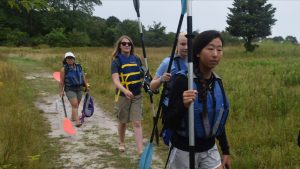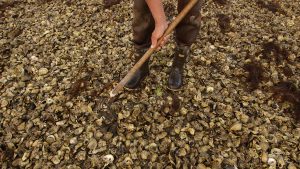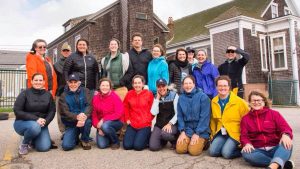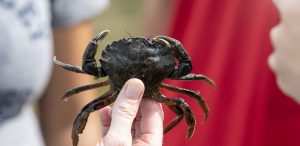Search results for: VIPREG2024 how to get 1xbet promo code Bolivia
Research on education: Learning by Listening to Marine Mammal Sounds
Learning by Listening to Marine Mammal Sounds Humpback whale photo courtesy of NOAA. Sept. 2018 — A Sea Grant-funded project aims to make science accessible to visually impaired students. Carla Curran, professor of marine sciences at Savannah State University, and Laela Sayigh, a biologist at Woods Hole Oceanographic Institution, worked with Kathy Patterson, the manager…
Read MoreWHOI-R-05-004 Bernhard, A. E. Loss of Divers
WHOI-R-05-004 Bernhard, A. E. Loss of Divers
Read MoreMy Girls in Science Experience – by Eugena Choi
Last February, when I heard about the Woods Hole Girls in Science program, I was excited. It combined my passion for conservation with marine biology, and I decided – on the spot – that I was going to go. I worked on my application for months before sending it in, and when I got the…
Read MoreBeach and Dune Profiles: An Educational Tool for Observing and Comparing Dynamic Coastal Environments
Beach and Dune Profiles: An Educational Tool for Observing and Comparing Dynamic Coastal Environments Helpful to educators and students. WHOI Sea Grant Marine Extension Bulletin, 6 pp., 2001 WHOI-G-01-001
Read MoreEnjoying Oysters Safely in Massachusetts
Each year, millions of fresh raw oysters are consumed in Massachusetts, most of them in the warm summer months. During that time, aquaculturists in the Commonwealth take extra precautions to safeguard their harvests from the heat, include icing oysters at the time of harvest – a step that can double or triple the weight of…
Read MoreTeacher Workshop April 2002
Teacher Workshop April 2002 “Determining the Resistance of Marine Animals to Environmental Chemicals” Dr. Mark Hahn, WHOI, Biology Department Dr. Hahn’s major research interests include receptor-mediated mechanisms of toxicity, and means of adaptation and acquired resistance to exposure to persistent organic pollutants. This presentation centered on looking at toxins in the marine environment, particularly dioxins,…
Read MoreShellfish Resource Management in Massachusetts
Shellfish Resource Management in Massachusetts Helpful to educators and students. Leavitt, D.F. Focal Points, 3 pp., 2000 WHOI-G-00-003
Read MoreTeacher-at-Sea Alumni Connect with Woods Hole Sea Grant
For educators who want to teach young people about ocean science, the opportunity to work with world-renowned scientists and experience life at sea aboard a research vessel is a dream come true. The NOAA Teacher at Sea Program gives teachers that opportunity, sending select teachers on research expeditions that last anywhere from two weeks to…
Read More“Marine Invaders” Educator Workshop Scheduled for December
Marine Invaders: Green crabs and other species are the featured subjects in the next WHSG Topics in Oceanography (TIO) workshop for informal and formal educators grades 6-12. The workshop is scheduled for Friday, December 3 from 9 a.m. – 4 p.m. at the Woods Hole Oceanographic Institution. The Woods Hole Sea Grant Program, WHOI Information Office,…
Read MoreResuspension of Postlarval Soft-Shell Clams Mya arenaria through Disturbance by the Mud Snail Ilyanassa obsoleta
Resuspension of Postlarval Soft-Shell Clams Mya arenaria through Disturbance by the Mud Snail Ilyanassa obsoleta Dunn, R., L.S. Mullineaux, and S.W. Mills Marine Ecology Progress Series, Vol. 180, pp. 223-232, 1999 WHOI-R-99-010
Read More



